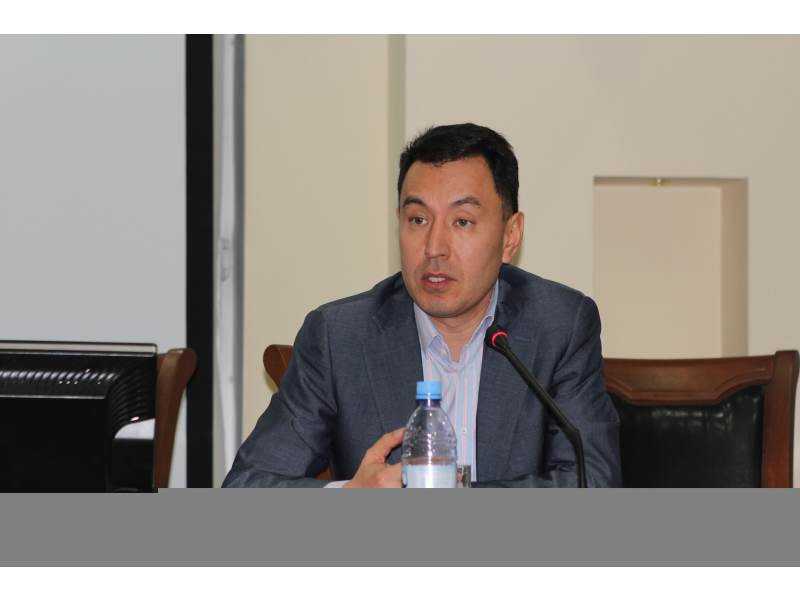Media
Independent director of "Damu" believes that the information provided by borrowers should be standardised for all banks

At the end of December, "Damu" Fund held a webinar hosted by Independent Director Serikbai Bisekeev, who has served on the Fund's Board of Directors since late July and heads the Committee on Appointments and Remuneration, while also participating in the Committees on Auditing, Strategic Development and Budgeting. Mr. Bisekeev is a successful businessman who established his own company - a manufacturer and supplier of integrated solutions in the energy and telecommunications industries - which has proved competitive on the Singapore market.
From the speaker's point of view, one of the most important changes that need to be made to programmes fulfilled by the Fund could be the unification of data provided by businesses to banks during the review process. Currently, the information requested during this process, as well as the different procedures in each bank, varies quite widely - which is a factor that reduces the appeal for businesses.
A more workable process would appear to be one where the same loan application and required set of documents can be offered to several banks. The speaker considers a more correct situation to be one where banks are seeking to obtain appropriate underwritten borrowers within the programme, and not vice versa.
The best solution would be, perhaps, the placing of applications within a kind of specialized resource, which the banks would have access to, and further competition would occur between them. According to estimates expressed during the webinar, such unification on the part of "Damu" is absolutely justified - given the fact that the fund is the largest creditor in the banking sector.
With regard to reducing the time spent on considering applications, the predominant view of banks, according to the independent director, is that the decision-making process could be greatly reduced if the banks were in possession of more information. And the requirements, according to Mr. BISEKEEV, could even represent certain elements of behavioural scoring, not only relating to credit history, but also, for example, to a potential borrower's academic performance and law-abidance.
To date, this amount of information cannot be obtained through the "First Credit Bureau", and the answer may lie in the creation of a database integrated with other state agencies. (That this contradicts the intention to unify the information provided by the borrower is only apparent, since everything related to the collection of baseline data for behavioural scoring will not pose complications for the borrower.)
During the webinar, Lyazzat Ibragimov, Chairman of the Fund, noted that on the initiative of Mr. Bisekeev, one of the issues discussed during the last board meeting was the necessity for projects to be approved by regional coordinating councils. Approval during such meetings is inappropriate, not only for industries but also for specific projects, since it is not always easy for functionaries to assess a particular business model.
Obviously after further discussion of this topic, joint proposals may be made by Mr. Bisekeev together with "Damu's" other Independent Director Oraz Zhandosov, who also participates in the work of "Atameken" Research and Production Enterprise. At the same time, Mr. Bisekeev responded antithetically to Panorama's question of whether there is any corruption potential in the implementation of programmes. According to him, everyone claims that this is not the case; the final decisions are made by the same banks that are responsible for repayment of the funds.
Another idea from the "fresh minds" is the ability to provide increased support to SME export projects. There is corresponding experience among many countries, including Singapore, that also have limited domestic markets similar to that of Kazakhstan. in Turkey, for example, a clear scheme exists where any small company that, say, produces and markets leather goods, can obtain support in the form of lease payments on defined shopping centre space in foreign markets - perhaps Kazakhstan should also be thinking in this way, as well as about the existence of direct air links with all the world's financial centres and easing the visa requirements for businessmen.
In answer to the question on recommendations to budding entrepreneurs for successful large-scale projects in Kazakhstan, the speaker said he did not believe in the possibility of large-scale technology start-ups. Perhaps more attention should be paid to the agricultural sector, livestock, and the processing of agricultural products.
At the same time, he seems to see a definite difference between the 90-s, when he started up his own business. At that time there was no internet, and it was very difficult to gain access to information; nevertheless, business-related books were read studiously. Entrepreneurs invested their own money in projects. Now, however, the prevailing mood among aspiring entrepreneurs seems to be: "when there are cheap loans, then there will be business initiatives."






